
The need for candles has taken on urgency with increased electrical blackouts in Ukraine after a recent torrent of Russian bombardments strained the country's power grid. These candles, brought from Poland, were distributed to residents of Zhovkva, Ukraine, at a Dominican convent. (GSR photo/Chris Herlinger)
Happy New Year, GSR readers! We hope 2023 has been treating you well so far.
Before we let 2022 slip away, I wanted to share a Global Sisters Report tradition. Almost every year since 2015 — with the exception of the two times I spent the turn of the new year on maternity leave — I have compiled an annual list of 10 noteworthy stories that Global Sisters Report published the previous year. Each story on our 2022 list had something about it that has stuck with me and is worth revisiting or enjoying for the first time if you missed it the first time.
We have some exciting projects in the works for 2023 that we can't wait to share with you.
In Ukraine, 'a mission for light' illuminates daily life far from the fighting by Chris Herlinger, published Dec. 8
When international correspondent Chris Herlinger went to Poland in late November, his goal was to cross the border into Ukraine for a few days to do some on-the-ground reporting there. We editors were cautious because of the risk, but Chris got the lay of the land on both sides of the border and was assured a quick visit to Zhovkva would be safe enough.
On Nov. 24 — Thanksgiving day in the United States — Chris entered Ukraine with Dominican Sr. Margaret Lekan and volunteer Malgorzata Porebska. In Zhovkva, he met with four Polish Dominican sisters and spoke with a number of Ukrainians about the war as the world geared up to celebrate Advent and Christmas.
The entire story is incredibly moving, but it's the ending that really got me. May peace return to Ukraine soon.
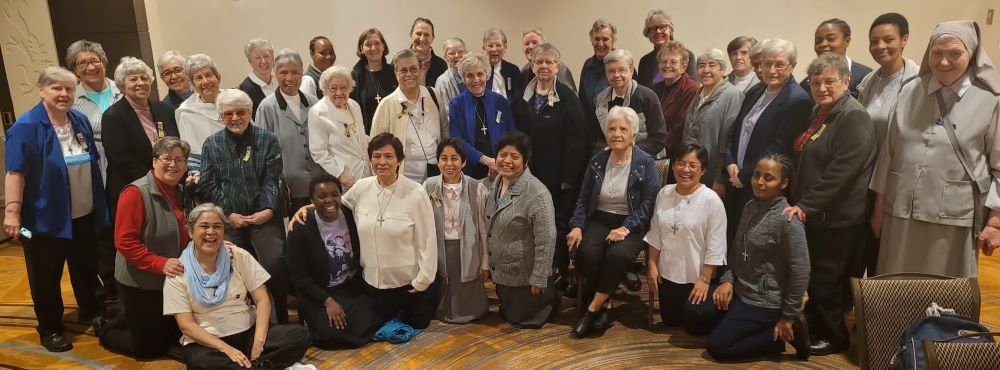
Missionaries of the Sacred Heart of Jesus gather ahead of the March 2022 pre-General Chapter Assembly. They came from Australia, Guatemala, Nicaragua, South Sudan and the United States. (Courtesy of Thérèse Hope Merandi)
The Life panelists discuss why they stay in religious life, published in August and September
Each month, Ursuline Sr. Michele Morek, GSR's liaison to sisters in North America who works with our columnists, poses a question to our panelists for The Life. One question she had up her sleeve for the 2021-22 panel: "Why do you stay in religious life?"
The question was so profound that we decided to let all 20 panelists answer the prompt. The result is a four-part series about faith, community and hope.
"How could I have known, when most of my encounters with consecrated people happened in beautiful churches and around a linen-clad dining table, that beneath all the joy I perceived was the heart-wrenching challenge of accompaniment? The self-giving solidarity of common life? The life-honing loneliness of consecrated celibacy? The beauty of communion in the body of a crucified Christ?" one panelist wrote. "How could I have known those things, which would break my heart and bind me deeply to the Mystery? That's why."
Part four contains links to the other three parts, and all are worth reading.
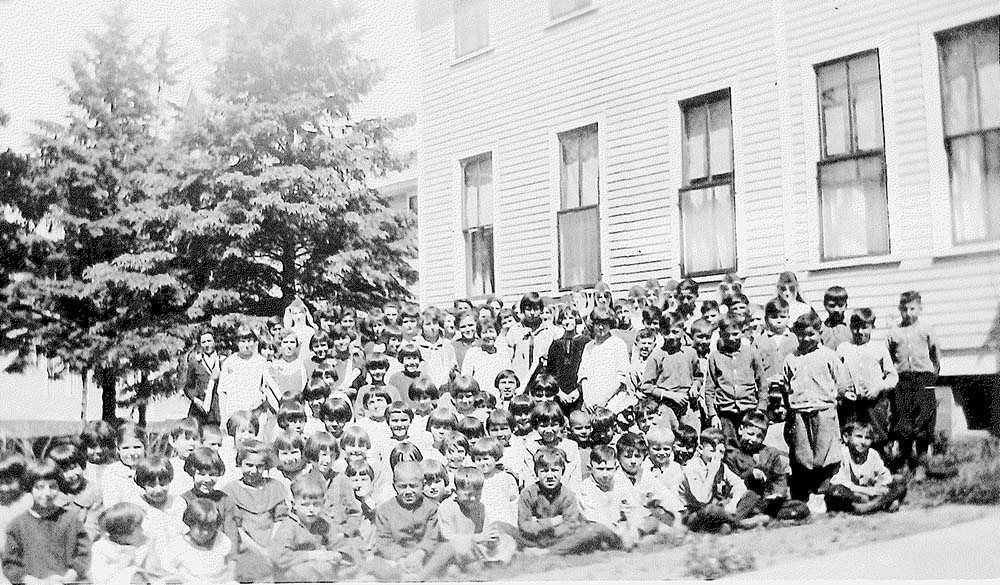
St. Mary's Catholic Indian Boarding School students pose for a photo during a school picnic during the 1922-23 school year. (Courtesy of the Franciscan Sisters of Perpetual Adoration)
US congregations face their complicity in trauma of Native boarding schools by Dan Stockman, published July 21
In late July, Pope Francis visited Canada to apologize to Indigenous peoples for abuses at Catholic-run boarding schools there. Canadian schools were modeled after those in the United States, many of them were operated by congregations of Catholic women religious. At these schools, Indigenous children as young as 5 were not allowed to speak their own language or practice their own religious or traditions.
The U.S. Department of the Interior in May released an initial report about the schools, showing they were rife with corporal punishment. As the government continues to examine the legacy of Native boarding schools, sisters too are looking at their histories through a new lens.
"We were operating in a system that was, in its intent, cultural genocide. So what do we do about that now?" said St. Joseph Sr. Sue Torgersen, who is on the steering committee of the Catholic Native Boarding School Accountability and Healing Project, which is working to address the role the Catholic Church played. "There's a lot of accountability needed on the part of the government and the various churches involved, including the Catholic Church."
Dan continues to report on this story, and GSR will publish more on U.S. boarding schools in the coming months.
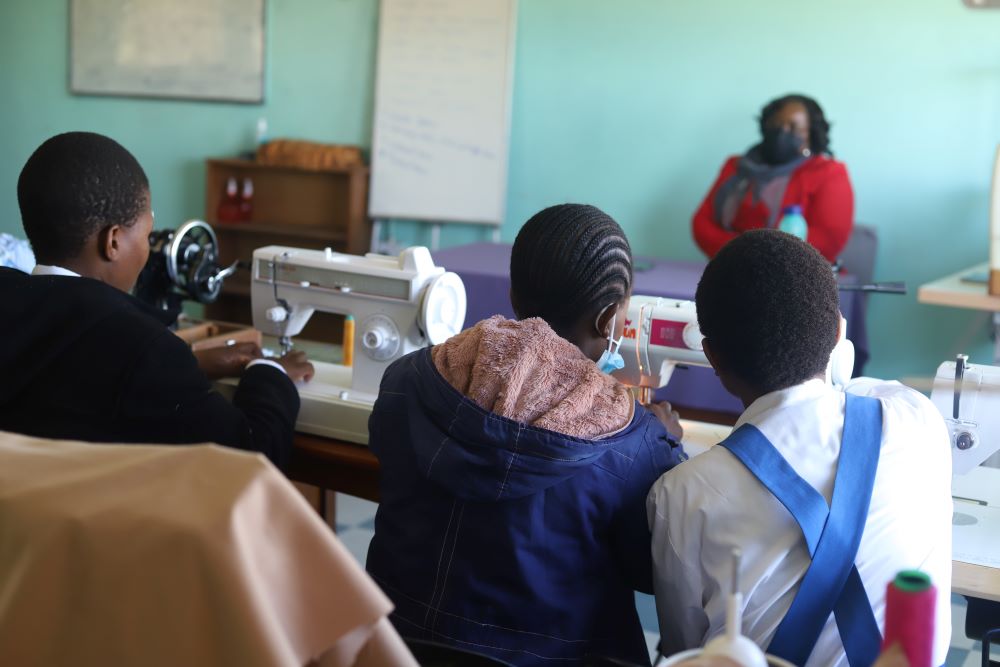
Good Shepherd Sisters of Quebec train young mothers to sew at the Good Shepherd Centre for Teenage Mothers in Berea Plateau, Lesotho, March 3. The sisters support teen mothers by providing shelter, daycare and medical assistance. They also teach sewing, catering, decorating, computer training and animal husbandry skills. (GSR photo/Doreen Ajiambo)
Teen moms in Lesotho find shelter, education with local sisters by Doreen Ajiambo, published Oct. 24
Thousands of girls in Lesotho are forced to abandon their education when they become pregnant. Even worse, because the country's culture discourages premarital sex, a girl who gets pregnant before marriage is likely to be excluded or banished from her family and is referred to as a "spoiled girl."
The Good Shepherd Centre for Teenage Mothers in Berea Plateau, a small mountainous town in Lesotho, provides a safe and supportive place for young mothers to live while they learn to care for themselves and children, learning skills such as hairdressing, sewing, farming and cooking.
"We are empowering these young mothers with skills so they can take care of themselves and live decent lives," Good Shepherd Sr. Filipina Hlobotsi told Africa/Middle East correspondent Doreen Ajiambo. "We don't discriminate. We admit all young mothers and those facing other abuses regardless of their faith, level of education or social status."
The way sisters globally empower the women they work with will never cease to inspire me.
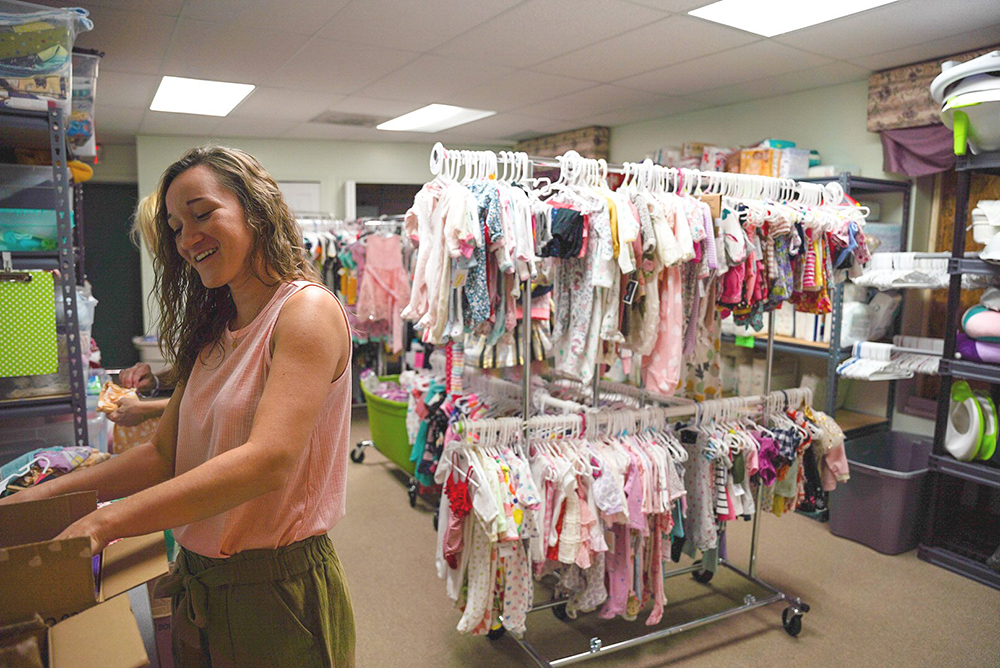
Emily Fitzgerald helps out in the clothing closet at the Lennon Pregnancy Center in Dearborn Heights, Michigan, on July 21. The center provides support and services to expecting parents. (CNS/Detroit Catholic/Valaurian Waller)
After Dobbs, US is not doing right by women and children, Catholic sisters say by Chris Herlinger, published Oct. 27
In June, the U.S. Supreme Court overturned the constitutional right to an abortion. But instead of focusing solely on the controversial issue, the women religious that Chris talked to in the months after the ruling focused on the ways the United States can better help women — pregnant women, in particular — and their families.
"Women are still marginalized, especially women of color and women who are economically marginalized. As a society, we need to do more to improve access to affordable housing, education, health care and spiritual support," said Mercy Sr. Mary Haddad, president and CEO of the Catholic Health Association of the United States. "Women have not had the support they need."
Expanding Medicaid under the Affordable Care Act, extending postpartum coverage and increasing access to support services like day care, preschool and quality food would be key, advocates told Chris.
"Can we at least have good resources for all women and all babies?" Mary J. Novak of Network said. "Let's just start there." Indeed.
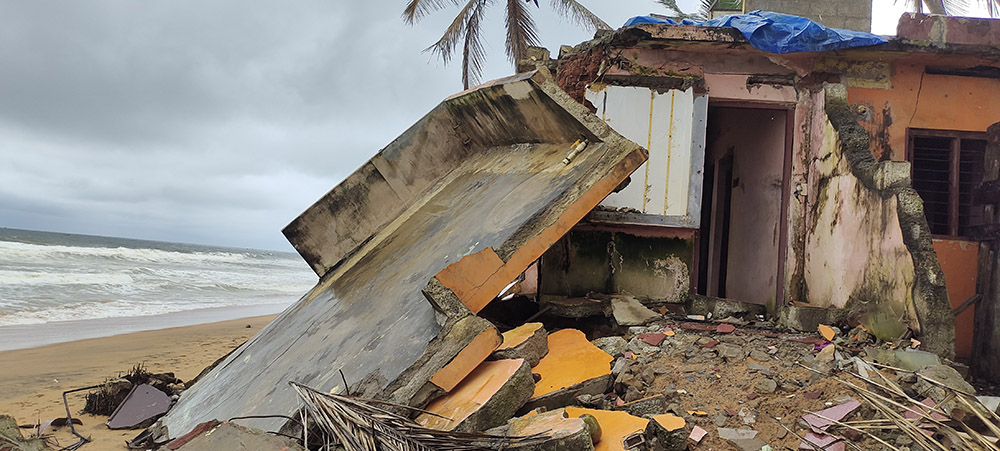
Houses destroyed by sea erosion are seen near the site of an international seaport under construction in the southwestern Indian state of Kerala. (GSR photo/Thomas Scaria)
Sisters support fisherpeople protesting new international seaport in India by Thomas Scaria, published Oct. 3
The under-construction Vizhinjam International Deepwater Multipurpose Seaport on the Arabian Sea coast near Thiruvananthapuram, capital of Kerala state, has wreaked havoc on the fishing harbor, causing "severe damage" to fishers' homes and livelihoods.
Hundreds of Catholic nuns have joined bishops, priests and activists to oppose the international seaport and support the fishers' demands for a rehabilitation package for those who have lost houses and jobs because of the port; subsidized kerosene; and a study about the environmental impact of the project.
Sr. Anna Thayyil, superior of the local Daughters of Mary Help of Christians, said most fisher families were in "utter poverty" during the worst of the COVID-19 pandemic and "have come out to protest out of sheer frustration."
Thayyil and her sisters now educate girls from the fisher communities so that they can find alternate jobs, "but how about the elders who only know fishing and are unwilling to leave the sea?"
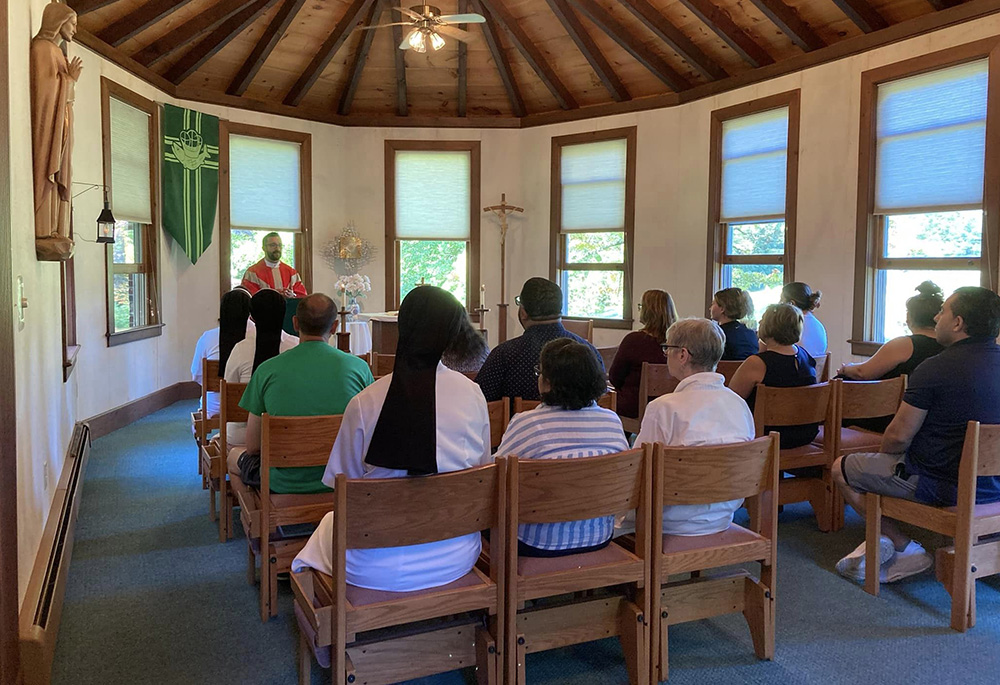
Retreat-goers gather Aug. 24 in the chapel at Sacred Heart on the Lake retreat center in Connecticut. The chapel was designed to match the other buildings on the grounds, which originally held a factory built in 1820. (Courtesy of the Apostles of the Sacred Heart of Jesus)
Sister-run retreat centers survive by pivoting as the pandemic continues by Dan Stockman, published Oct. 31
As the United States went into lockdown in March 2020 at the start of the COVID-19 pandemic, sister-run retreat centers sat empty. Income they brought in disappeared, but the costs of maintaining them did not. Larger communities and retreat centers with more resources were able to weather the storm. Smaller ones could not.
"We were founded for retreats in 1826 — that's our life," Sr. Pamela Falkowski, the province leader for the Cenacle Sisters, told Dan. The congregation closed their retreat center on Long Island in New York in 2020 partly because of the pandemic and closed the Chicago center, their last one, a year later.
Dan's story also examined how the centers that did remain open pivoted to Zoom and other ways to bring people together for spiritual sustenance. The Apostles of the Sacred Heart of Jesus in Connecticut even started a retreat center during the pandemic.
"We know there's a hunger for a deepening relationship within people, in our whole society," said Sr. Joanne Gallagher, director of communications for the Sisters of St. Joseph of Boston. "It's so much more than just offering prayer services or a retreat."
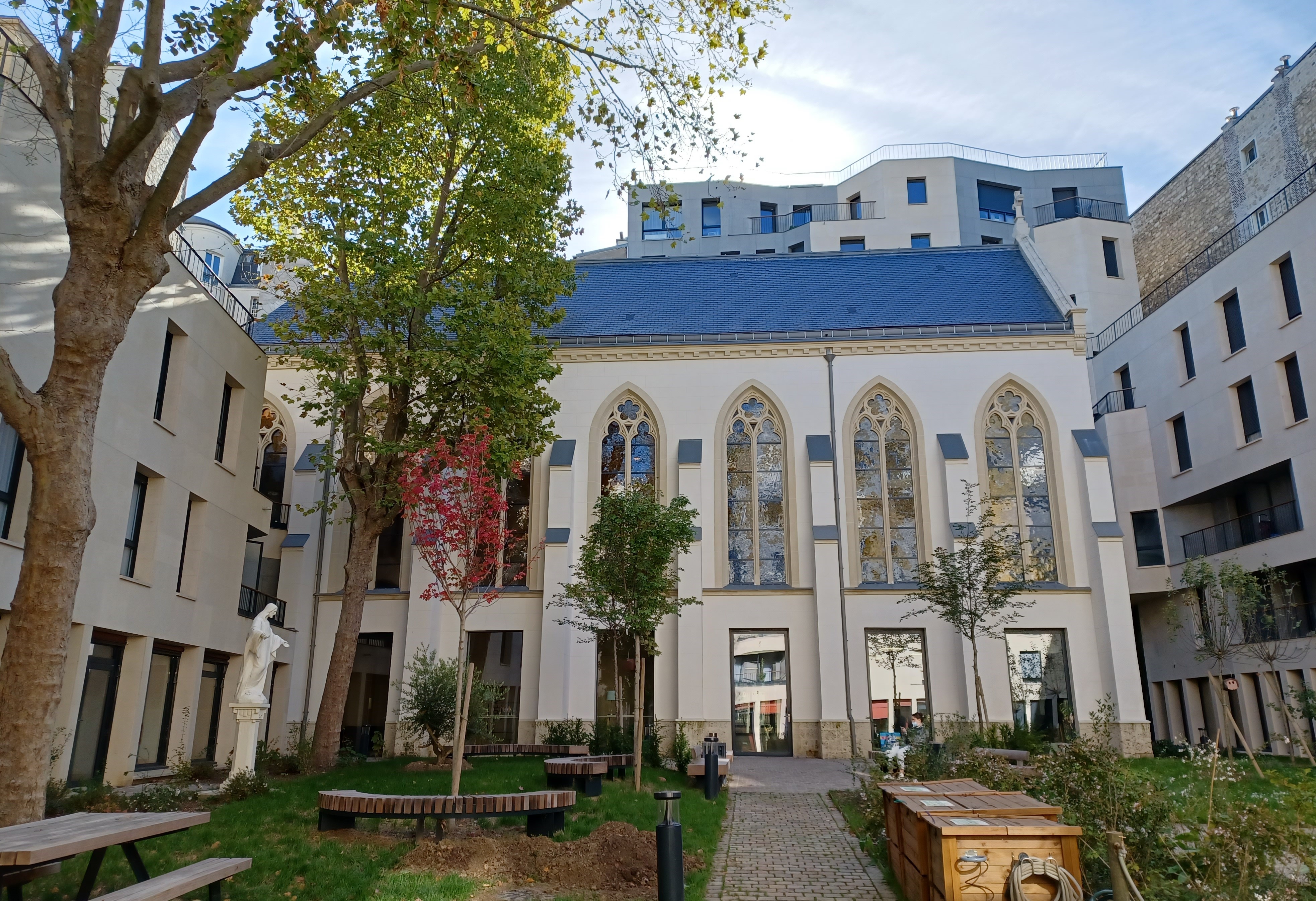
The Dominican Sisters of the Presentation took a proactive approach to how to use their Paris property as their membership dwindled. Pictured here is their Maison St.-Charles in the 15th Arrondissement, a facility that houses sisters as well as people who need low-cost housing, a co-working space, three meeting rooms for rent and 15 guest rooms. (Elisabeth Auvillain)
Paris Dominicans turn property into home for families, students, sisters by Elisabeth Auvillain, published Nov. 7
Since 1870, the Dominican Sisters of Charity of the Presentation of the Blessed Virgin have owned property in the 15th Arrondissement of Paris. But now, things are different: There are fewer religious women, and congregations have been selling properties. Instead of waiting until the last minute, the Dominican Sisters of the Presentation had other plans.
"We were eager to ensure the perennity of our vocation," prioress Sr. Véronique Margron told Elisabeth Auvillain. "We wanted to create something useful, strong, lasting and beautiful that was in accordance with our vocation of hospitality and solidarity."
The sisters sold part of the land to a real estate company for high-class apartments, which gave the congregation the money it needed to finance housing people who applied for low-rent apartments run by the city of Paris. Everything was finished and people moved in several months ago.
This inspiring story is part of our ongoing series of how sisters' congregations are transforming their buildings and lands as they look forward to the future. You can read more from that series here.
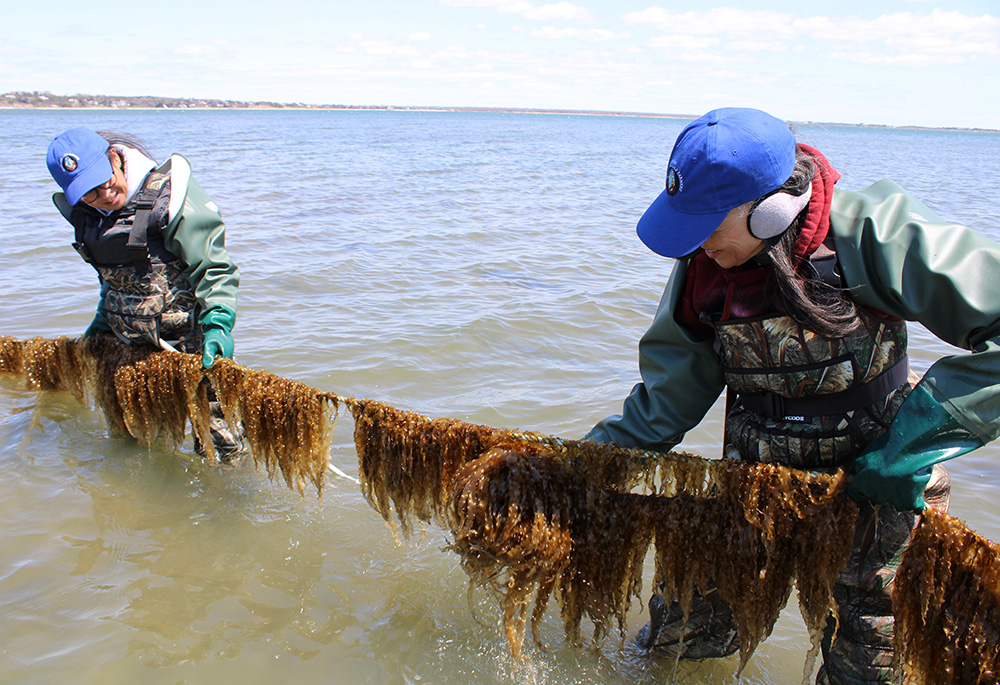
Shinnecock kelp farmers Donna Collins-Smith, right, and Danielle Hopson Begun check a line of sugar kelp being grown in Shinnecock Bay on eastern Long Island, New York. The lines are covered with rich, brown, translucent sugar kelp, which has a biting taste that is both salty and sweet. (GSR photo/Chris Herlinger)
Shinnecock women, allied with Catholic sisters, farm kelp to restore bay waters by Chris Herlinger, published June 23
Chris, who lives in New York City, visited Shinnecock Bay on eastern Long Island a few times to report this story and even got in the water with the kelp farmers to photograph them at work.
In addition to the great photos, the story stuck with me because of the partnership between the Sisters of St. Joseph of Brentwood, New York, and members of the sovereign Shinnecock Indian Nation.
The sisters publicly acknowledge that their campus sits on "occupied indigenous land," which the Shinnecocks says white settlers stole beginning in the late 1850s.
Six Shinnecock women have worked to protect and preserve the bay since early 2021, when the women approached the sisters about raising sugar kelp in the waters off of the sisters' property. Sugar kelp has the ability to sequester carbon, which helps combat ocean acidification.
Shinnecock member Rebecca Genia said the sisters are "friends, sisters, allies, partners. At this point, they're almost like extended family. They are golden-hearted people."
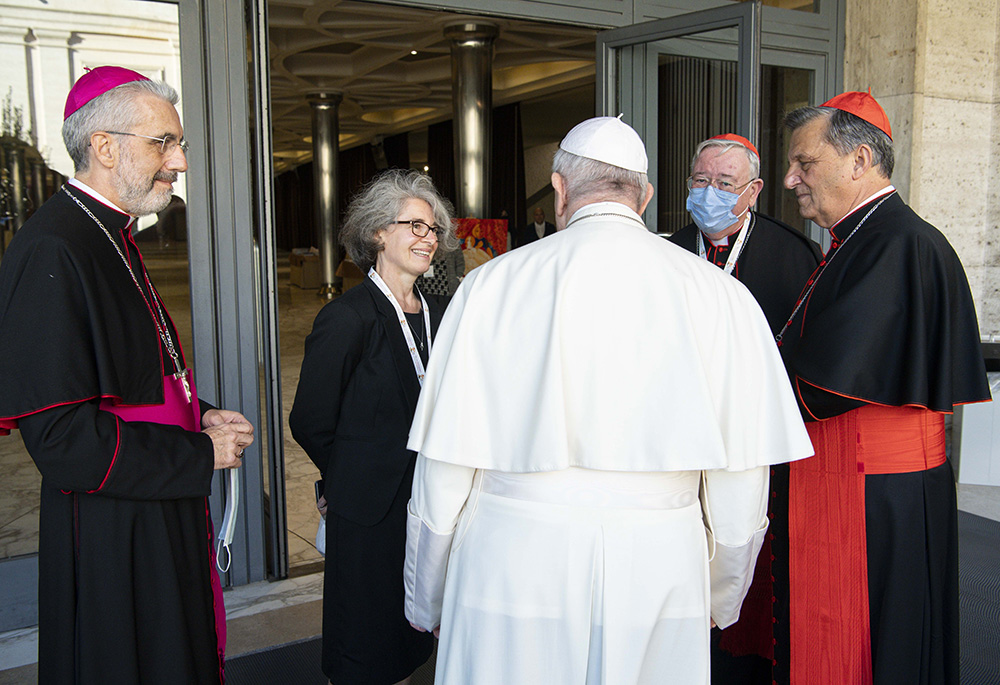
Pope Francis talks with officials of the Synod of Bishops during a meeting with representatives of bishops' conferences from around the world Oct. 9, 2021, at the Vatican. From left: Bishop Luis Marín de San Martín, undersecretary of the Synod of Bishops; Sr. Nathalie Becquart, undersecretary of the synod; Cardinal Jean-Claude Hollerich of Luxembourg, relator general of the synod; and Maltese Cardinal Mario Grech, secretary-general of the synod. (CNS/Paul Haring)
Halfway through 2022, catch up with Global Sisters Report by Pam Hackenmiller, published July 4
OK, this one is a bit of a cop-out. You may have noticed that the other stories in this roundup are only from the back half of 2022, and this roundup of noteworthy stories from the first half of 2022 is why.
However, if you have the time and inclination, it's well worth your time to scroll through this collection to see what, if anything, you missed earlier in the year. Some topics we continued to cover throughout 2022, including the war in Ukraine and the ways in which congregations are transforming the buildings or land they no longer need, but others were discrete reports, such as the celebration of Network's 50th anniversary and the increased role of women at the Vatican.
We look forward to what 2023 will bring. Thanks for reading Global Sisters Report.







